17 Jan2020
By Caitlin Wilson

AACTE is excited to work in partnership with the National Board for Professional Teaching Standards on several initiatives that contribute to a vision of a coherent career trajectory that supports teachers from initial preparation through teacher leadership opportunities and beyond. The mission of the National Board is to advance the quality of teaching and learning through a voluntary advanced certification. By doing so, the National Board aims to align the teaching profession with other professions such as medicine. Through this collaboration, AACTE, National Board, and other teacher professional organizations seek to elevate the teaching profession and ensure each student is taught by a fully prepared and accomplished teacher.
The work of the National Board, the National Board Standards, and the certification process is founded on five core propositions that describe what accomplished teachers should know and be able to do to effectively support student learning. The five core propositions and National Board Standards are developed and revised by educators based on research and their expertise as practitioners.
14 Jan2020
By Jacqueline Rodriguez

AACTE and partner, Educator Preparation Laboratory (EdPrepLab), an initiative of the Learning Policy Institute (LPI) and Bank Street College of Education, will host the second of a series of four webinars, Preparing educators for diverse, equitable, and inclusive classrooms, on January 30.
This collaborative webinar focuses on strategies to increase the preparation of both teachers and leaders. AACTE and EdPrepLab are excited to provide you with an opportunity to learn from and with our dynamic webinar leaders. Four dynamic experts who are advancing diversity, equity, and inclusion in their practice, research, and daily interactions with teachers, leaders, and community stakeholders will present during the webinar:
10 Jan2020
By Ward Cummings
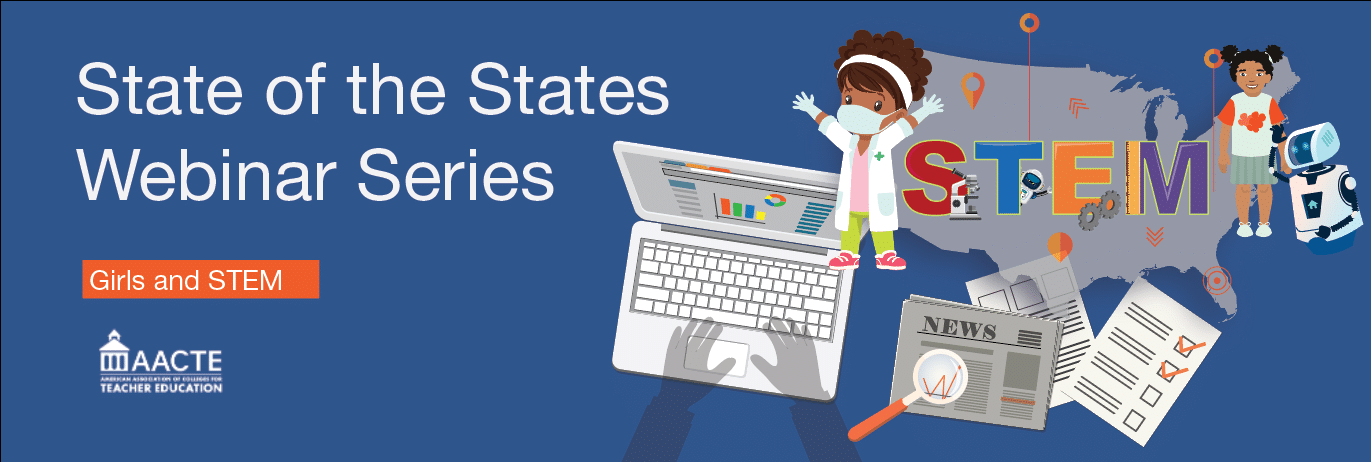
The subject of this month’s State of the States webinar is Girls and STEM. In 2009, four university researchers explored their suspicion that girls’ lagging behind boys in math achievement was substantially influenced by the math anxieties of their female elementary school teachers. The result of their research showed their suspicions to be correct and that some of the achievement gap was indeed a result of female teachers’ own apprehensions about math and their personal biases about the abilities of female students. The researchers found that female students can pick up on and even absorb negative thoughts from their teachers as early as kindergarten. Learn more.
Since that study was conducted, the achievement gap in math between boys and girls has narrowed, but still persists. The webinar will focus on what states are doing legislatively, with programs and with policy to eradicate the STEM achievement gap.
Register now for this members-only webinar:
State of the States: Girls and Stem
Wednesday, January 22
10:00 a.m. ET
06 Jan2020
Virtual Math Mentorship Project: Partnering Elementary Math Methods Course with Rural Title 1 School
By Jennie Carr and Tammy T. May
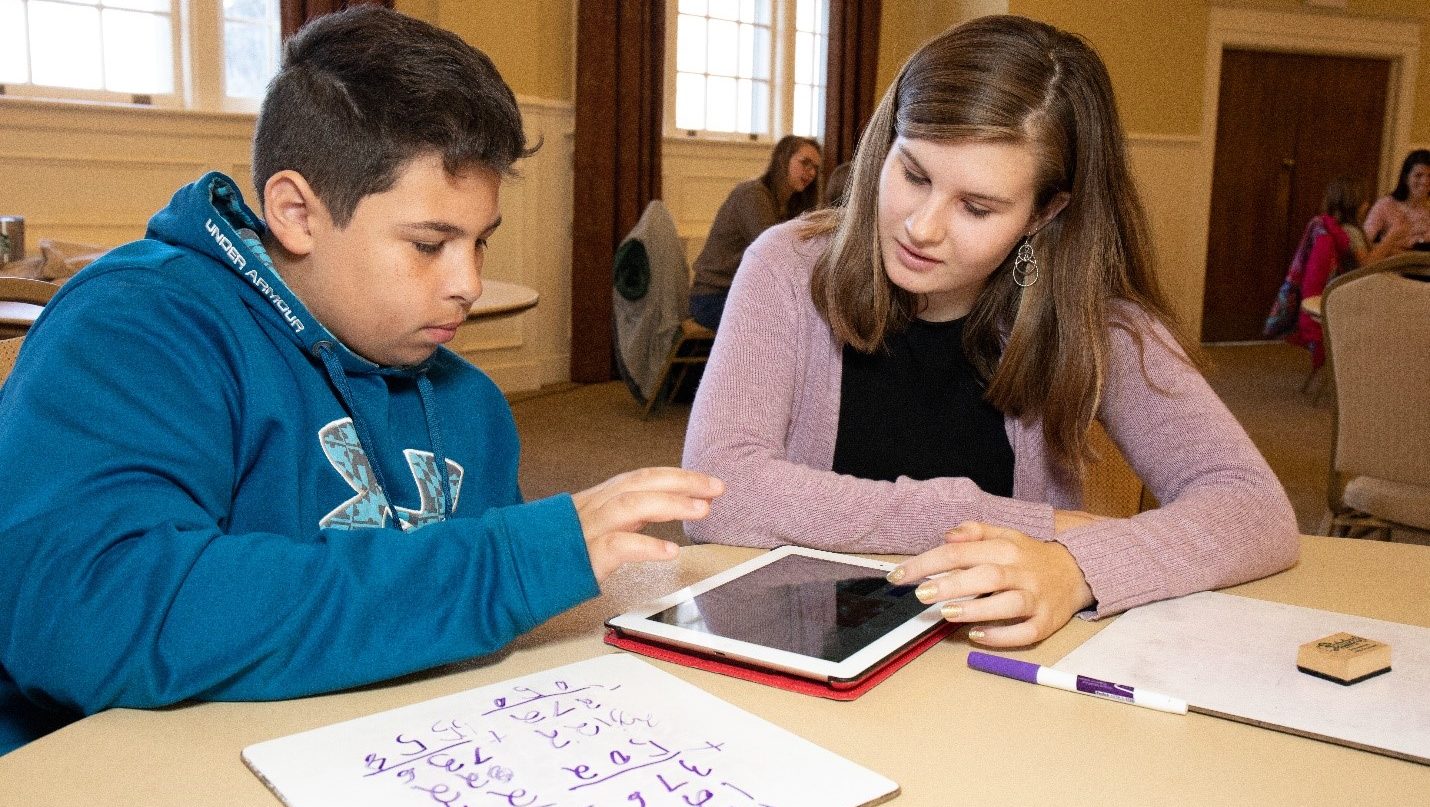
Photo Credit: Ben Wyrick
Ed Prep Matters features the “Revolutionizing Education” column to spotlight the many ways AACTE, member institutions, and partners are pioneering leading-edge research, models, strategies and programs that focus on the three core values outlined in the current AACTE strategic plan: Diversity, Equity, and Inclusion; Quality and impact; and Inquiry and Innovation.
This article was written by Jennie M. Carr of Bridgewater College and Tammy T. May of Rockingham County Public Schools.
Educator preparators are often seeking unique and meaningful experiences for their teacher candidates. With the knowledge that high quality mentoring relationships can demonstrate positive improvements in academic performance, attendance, feelings of self-confidence, resilience, perceived social acceptance, and relationships with others, we began working collaboratively to create a mutually beneficial math mentorship partnership between Bridgwater College and an elementary school in the Rockingham County Public School District (Coller & Kuo, 2014; Masters & Kreeger, 2017). The logistics of managing a traditional face-to-face mentoring experience was too difficult and there is no required field experience in the college’s elementary math methods course. Because online tools are typically utilized on college campuses and with the school district’s recent 1:1 Chromebook adoption, we crafted the virtual math mentorship (Hartun & Harvey, 2015).
Connecting the virtual math mentorship to teacher candidates’ capstone project in the math methods course was vital to its success. The eight-week project consisted of a teacher candidate field trip to the elementary school, two virtual Google Hangout sessions, four virtual Seesaw pen pal exchanges, and the creation of a personalized and interest-based differentiated math lesson for a fifth grade mentee, which was implemented during the students field trip to Bridgewater College.
02 Jan2020
By Carly Leatherwood and Samantha Pelham
This article originally appeared on the Ohio University Ohio News website and is reprinted with permission.
Ohio University received the Teacher Quality Partnership (TQP) grant that will allow OHIO to partner with the Educational Service Center of Central Ohio (ESCCO) to improve the quality of OHIO’s special education teacher preparation program, which will improve the academic achievement of K-12 students.
The grant will span over five years, totaling more than $4.1 million to help accomplish this goal. It also provides opportunities for adult learners, supporting OHIO’s Strategic Framework and the initiative to catalyze strategic enrollment for lifelong learning.
“This partnership with ESCCO allows Ohio University to serve Ohio in preparing the next generation of teachers to work with all learners,” said Renée A. Middleton, dean of the Patton College of Education. “Our vision statement is ‘The Patton College—Where Learning Has No Limits!’ This partnership for teacher quality will allow us to fulfill that vision and commitment.”
12 Dec2019
New Education Doctorate Focused on Social-Emotional Learning Is One of the First of Its Kind
By Kate Stringer
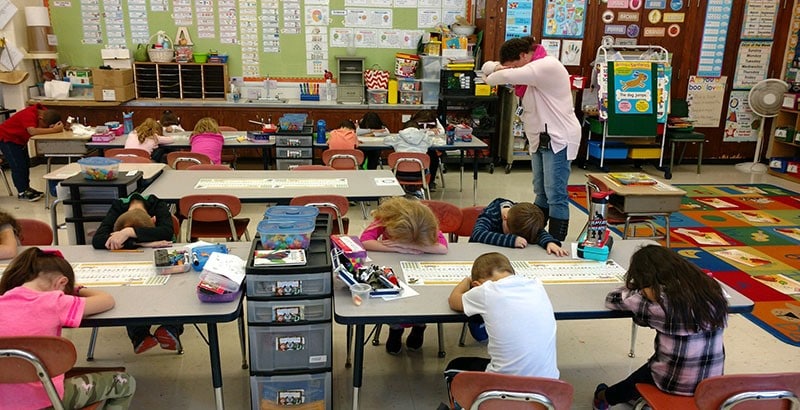
Kindergarten teacher and doctoral student Kimberly Atkinson directs her students in a stretching exercise with belly breathing to help them reset their bodies and minds for learning.
Ed Prep Matters features the “Revolutionizing Education” column to spotlight the many ways AACTE, member institutions, and partners are pioneering leading-edge research, models, strategies and programs that focus on the three core values outlined in the current AACTE strategic plan: Diversity, Equity, and Inclusion; Quality and Impact; and Inquiry and Innovation.
This article originally appeared in The 74 and is reprinted with permission.
Seven years ago, Michael P. Alfano was sitting in his office at Southern Connecticut State University when a faculty member ran into the room in tears. That was how he first learned about the deadly school shooting 20 miles away at Sandy Hook Elementary School, where 26 people—including a student in his graduate education program, first-grade teacher Victoria Soto—were killed.
The tragedy sparked a reckoning in Alfano—and educators across the country—who questioned whether school systems had failed to support individuals who acted out so violently. For Alfano, part of preventing a shooting, bullying, or any other form of violence in schools meant addressing childhood trauma, helping students understand and manage emotions, and training educators in this work.
09 Dec2019
By Patricia Alvarez McHatton
Racist Curricula in the 21st Century Do Exist
Any curriculum, even the most enlightened, has traces of racism. This is simply because we all have biases that come through in multiple ways. Our responsibility as educators is to be critically self-reflective and continuously monitor ourselves, our work, and our interactions with both the students we teach and those around us.
Invariably, believing we are culturally and linguistically responsive and sustaining is an indication that we still have work to do. This is because we are always in a state of becoming. New experiences and knowledge expand our ways of thinking and intersect with our lived experiences making the familiar strange. This is true for individuals and curriculum. That is why continuous critical self-reflection is essential as it affords us the opportunity to negotiate uncomfortable and challenging spaces, experiences, and interactions. It is through this disruption that we learn.
27 Nov2019
By J.C. Bowman
 This article originally appeared in the Chatanoogan.com and is reprinted with permission.
This article originally appeared in the Chatanoogan.com and is reprinted with permission.
As educators, we are concerned about the quality and quantity of applicants entering the field of education. Our members have often been catalysts for innovative solutions to the many challenges facing education. This is why we take an interest in the next generation of educators and why we strive to improve their experience and support as they transition from teacher candidate to classroom teacher.
In 1986, education school deans from the top universities developed a critical report that attributed much of the blame for struggling public schools on the training teachers were receiving in college.
Research reminds us that although we spend millions of dollars and thousands of hours on teacher preparation courses, we do not have much evidence justifying some of those requirements in Colleges of Education. Nor do policymakers really know how to measure and define a successful teacher training program.
22 Nov2019
By Katrina Norfleet
Ed Prep Matters features the “Revolutionizing Education” column to spotlight the many ways AACTE, member institutions, and partners are pioneering leading-edge research, models, strategies and programs that focus on the three core values outlined in the current AACTE strategic plan: Diversity, Equity, and Inclusion; Quality and impact; and Inquiry and Innovation.

AACTE recently released its 2020-2023 Strategic Plan, which includes a new vision statement: AACTE, its members, and partners collaborate to revolutionize education for all learners. Aligned with the new strategic plan, Ed Prep Matters is launching a new column called Revolutionizing Education to showcase the many ways the Association and member institutions are moving beyond traditional perspectives and are pioneering positive change in educator preparation.
The Revolutionizing Education column is an opportunity for member institutions and partners to share the leading-edge research, models, strategies, programs, and initiatives that focus on the three core values outlined in the new AACTE strategic plan:
- Diversity, Equity, and Inclusion
- Quality and impact
- Inquiry and Innovation
20 Nov2019
By Maria Hyler

On November 14, I had the privilege of moderating the first in a series of webinars produced through a partnership of AACTE and the Educator Preparation Laboratory (EdPrepLab). This webinar, “Social and Emotional Learning, Cultural Competence, and Equity in Teacher Preparation,” will be followed by three others focusing on transformative research and practice in educator preparation.
Joining me for the webinar were Nancy Markowitz of the Center for Reaching and Teaching the Whole Child, Patty Swanson from San Jose State University, Pat Norman from Trinity University, and Mari Jones from the HighTech High Graduate School of Education.
Both Trinity and High Tech High, where Norman and Jones teach, are members of the EdPrepLab network. EdPrepLab, which launched this year, is an initiative of the Learning Policy Institute and the Bank Street College of Education that aims to strengthen educator preparation in the United States by linking research, policy, and practice and by supporting and expanding preparation that is equity-focused, student-centered, and grounded in the science of learning and development.
07 Nov2019
By California State University Monterey Bay
 California State University Monterey Bay (CSUMB) has been selected to receive funding under the U.S. Department of Education’s Teacher Quality Partnership (TQP) program in the amount of $4,849,320; $2.2M of which will go directly to student scholarships.
California State University Monterey Bay (CSUMB) has been selected to receive funding under the U.S. Department of Education’s Teacher Quality Partnership (TQP) program in the amount of $4,849,320; $2.2M of which will go directly to student scholarships.
The award, expected to span over a total of five years, will also help fund a project entitled Preparing Observational Practitioners through Partnerships Yearlong (POPPY) and support CSUMB partnerships with eight school districts across Monterey County, further advancing the “grow your own” model of teacher preparation.
06 Nov2019
By Clay Smith
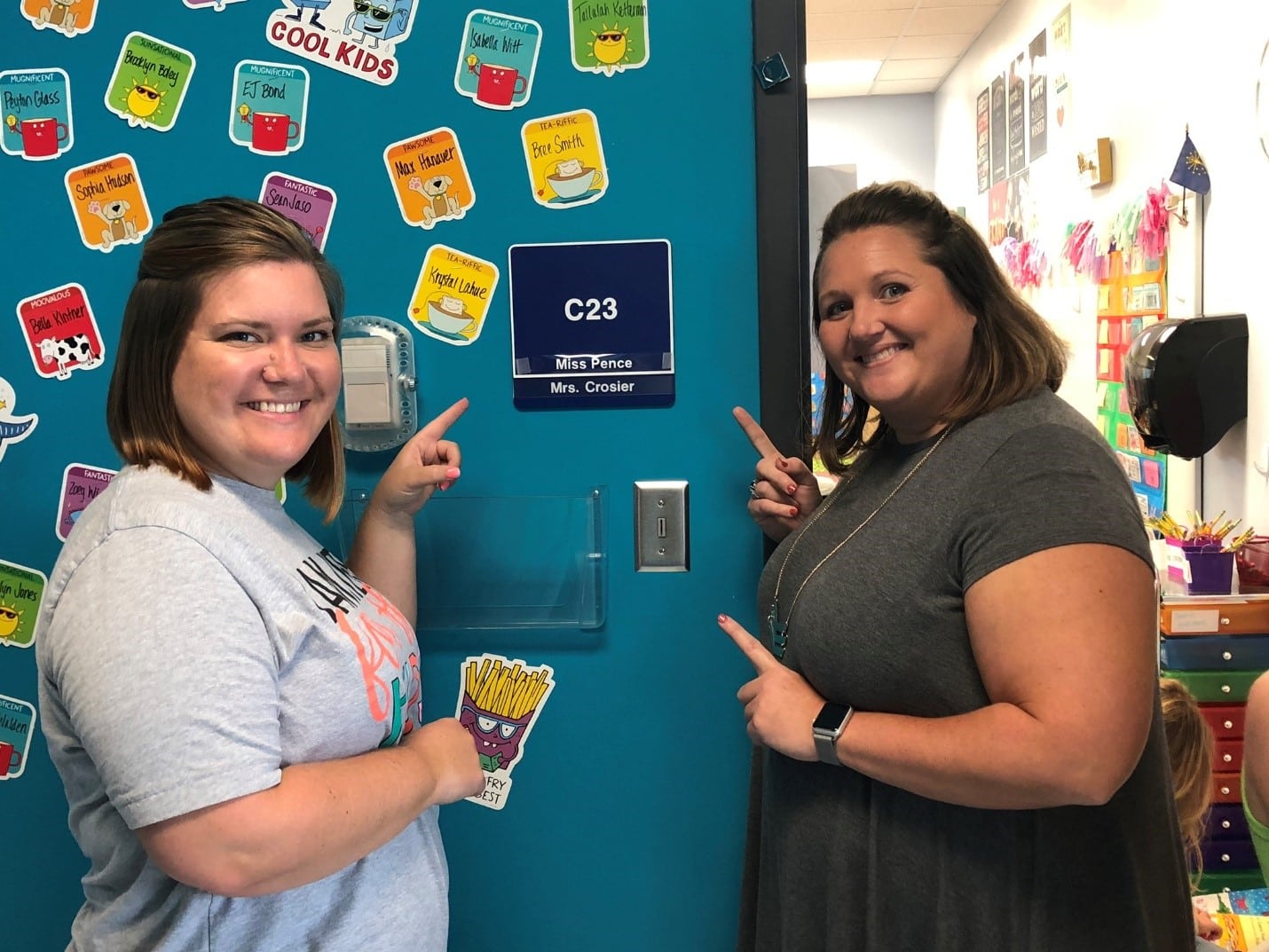 Collaborative. Encouraging. Communicative. Supportive. Empowering. These are characteristics that contemporary educator preparation programs are committed to building within their traditional teacher candidates. For co-teaching teams, however, these traits are more than preferred; they are essential to success.
Collaborative. Encouraging. Communicative. Supportive. Empowering. These are characteristics that contemporary educator preparation programs are committed to building within their traditional teacher candidates. For co-teaching teams, however, these traits are more than preferred; they are essential to success.
Co-teaching is an innovative pedagogical model adopted to maximize instructional impact and engagement amongst preservice and in-service teachers. Thanks to the support of the AACTE, the “Co-Teaching in Clinical Practice” Topical Action Group (TAG) is able to advocate for co-teaching and support co-teachers in schools throughout the nation.
06 Nov2019
By Hannah Astin
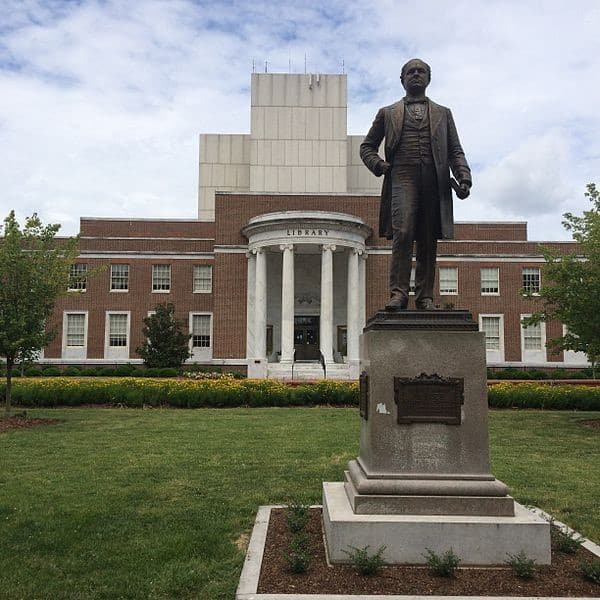 This article originally appeared in The Carolinian and is reprinted with permission.
This article originally appeared in The Carolinian and is reprinted with permission.
With a new multi-million-dollar grant, UNC-Greensboro’s (UNCG) School of Education will create a new teaching program focused on bringing high-tech thinking to two rural North Carolina counties.
The 5-year, $6.1 million grant comes from the Teacher Quality Partnership grant program under the United States Department of Education.
UNCG School of Education will use the grant money to establish the Piedmont Teacher Residency Partnership. The Partnership will train new teachers in new technology and problem solving, and the teachers will be placed in some public schools in Rockingham and Surry counties.
05 Nov2019
By John Kuykendall

Our nation and the entire world are changing rapidly. With the rise of threats to our children’s safety like depression, lack of mental health resources, familial disruptions, and school violence and shootings, it is imperative that we equip teachers and school personnel with the tools they need to recognize and respond to all students, in all classrooms.
In today’s schools, students are suffering from a variety of issues; one that arises too often is mental health. Unfortunately, it is not always apparent what these students are experiencing. Depression is rampant. Emotional stress stems from a variety of external factors including depression, divorce, social media anxiety, lost friendships, bullying or simply feeling out of touch with others. It is imperative, now more than ever, that our teachers are prepared to notice when students are experiencing these types of trauma. Trauma informed practices allow teachers to be trained well beyond the obvious clues and prepares them to be aware of early, less apparent warning signs, so they can successfully and swiftly intervene to help a student in need.
04 Nov2019
By Diana Lambert

This article and photo originally appeared in EdSource and are reprinted with permission.
Jennifer Garza, a 7th grade English teacher at Green Acres Middle School in Visalia, was teaching on an intern credential in 2015.
Two federal grants totaling over $9.4 million will help California recruit teachers and mental health professionals to rural schools.
The U.S. Department of Education awarded the five-year grants to the California Center on Teaching Careers, an organization started in 2016 to help solve the persistent teacher shortage. The center is run by the Tulare County Office of Education, in partnership with California State University Bakersfield.












 This article originally appeared in the
This article originally appeared in the 

 California State University Monterey Bay (CSUMB) has been selected to receive funding under the U.S. Department of Education’s Teacher Quality Partnership (TQP) program in the amount of $4,849,320; $2.2M of which will go directly to student scholarships.
California State University Monterey Bay (CSUMB) has been selected to receive funding under the U.S. Department of Education’s Teacher Quality Partnership (TQP) program in the amount of $4,849,320; $2.2M of which will go directly to student scholarships. Collaborative. Encouraging. Communicative. Supportive. Empowering. These are characteristics that contemporary educator preparation programs are committed to building within their traditional teacher candidates. For co-teaching teams, however, these traits are more than preferred; they are essential to success.
Collaborative. Encouraging. Communicative. Supportive. Empowering. These are characteristics that contemporary educator preparation programs are committed to building within their traditional teacher candidates. For co-teaching teams, however, these traits are more than preferred; they are essential to success.  This article originally appeared in
This article originally appeared in 
